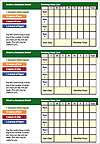Drinking Diary Card and Change Plan Template - Alcoholic Liver Disease
 Drinking Diary Card and Change Plan
Drinking Diary Card and Change Plan
One intervention that can be effective for patients in early stages of changing their drinking habits is to have them self-monitor their alcohol consumption. The wallet cards included in the toolkit provide the patient a means to record their alcohol use over a 4-week period. Typically, this is done by converting whatever alcoholic beverages are consumed during the day to a certain number of "standard drinks." A standard drink is defined as:
- 12 ounces of beer
- 4 ounces of wine
- 1.5 ounces of liquor
The act of measuring a behavior is in itself an intervention. Patients who use the Drinking Diary Card will have a more concrete understanding of how much alcohol they are consuming on either a regular or episodic basis. They may also use this information to understand some of the social contexts or special occasions in which they drink heavily. From a harm-reduction perspective, any decrease in alcohol consumption will likely lessen the risk of liver damage to some degree. This exercise in self-monitoring can serve as a valuable first step in making reductions in the amount of alcohol the patient consumes per occasion or over time.
On the back of the Drinking Diary Card is a template for making a Change Plan. Research on goal-setting has shown that goals are more likely to be pursued and accomplished when they are made explicit, achievable, and public (i.e., with a verbal commitment). The Change Plan provides a mechanism for patients to state their behavior change goals explicitly and problem-solve about how to realize them. The questions posed by the Change Plan Template are:
- "My specific goal is to . . ."
- "The steps I plan to take in changing are . . ."
- "Challenges that might interfere:"
- "How I will handle these challenges:"
- "I will know my plan is working if . . ."
Change Plans are meant for patients in later stages of change about their drinking, for they presume that the patient is willing to make some attempt at behavior change. If you hear your patient making positive statements about reducing or quitting drinking (i.e., "change talk"), it may be an appropriate time to introduce this wallet card to discuss the specific steps and possible barriers associated with making that change.




















